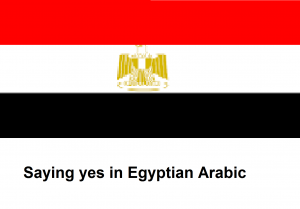Language/Egyptian-arabic/Vocabulary/Say-Yes
Hello everybody,
In today's lesson, you will learn different ways to say "YES" in Egyptian Arabic. Egyptian Arabic, also known as the Egyptian colloquial language or simply Masri, is the spoken language in Egypt and the most widely understood dialect in the Arab world.
Feel free to edit this page by adding new words and expressions!
Consider broadening your understanding by checking out these related lessons: Travel and Tourism & Resources.
Different ways to say "YES" in Egyptian Arabic[edit | edit source]
| EGYPTIAN ARABIC | PRONUNCIATION IN ENGLISH | USAGE | COMMENT |
|---|---|---|---|
| حاضر | hah dehr | Formal/Informal | More common, similar to "okay" or "understood" |
| ماشي | meh shih | Informal | More common, similar to "alright" or "okay" |
| ان شاء الله | ihn shahl lah | Formal/Informal | More common, means "God willing" or "if God wills" |
| طيب | tah eeb | Informal | Means "fine" or "okay" |
| اوكيه | ou kay | Informal | Borrowed from English, means "okay" |
| تمام | tah maan | Informal | Means "perfect" or "alright" |
| نعم | naAm | Formal | Standard Arabic for "yes" |
In Egyptian Arabic, the context and the level of formality often dictate which form of "yes" is appropriate to use. It is essential to be aware of these nuances to ensure effective communication and avoid any misunderstandings. Here are some examples of how to use these different expressions in context:
- حاضر (hah dehr) - This can be used to show agreement or understanding in both formal and informal situations. For example, if your boss asks you to complete a task, you can reply with "hah dehr."
- ماشي (meh shih) - This expression is suitable for informal situations, such as when a friend asks if you'd like to join them for a meal, and you agree by saying "meh shih."
- ان شاء الله (ihn shahl lah) - This phrase can be used in various contexts to express hope or the intention to do something, provided that it aligns with God's will. For example, when someone asks if you will attend a future event, you can reply with "ihn shahl lah."
- طيب (tah eeb) - Use this phrase in informal settings when you want to say "fine" or "okay." For instance, if a friend suggests a plan, and you agree with it, you can say "tah eeb."
- اوكيه (ou kay) - This expression, borrowed from English, can be used in informal situations to indicate agreement, similar to "okay" in English.
- تمام (tah maan) - Use this expression to indicate that everything is perfect or alright in an informal setting.
- نعم (naAm) - This is the standard Arabic term for "yes" and can be used in more formal situations.
Dialogue[edit | edit source]
- Ali: مرحبًا ياسمين، هل تودين الذهاب إلى السينما الليلة؟ (Marhaban, Yasmin. Hal tawdeen al-dhahab ila al-cinema al-laila?) (Hello Yasmin, would you like to go to the cinema tonight?)
- Yasmin: ان شاء الله، ما الفيلم الذي سنشاهده؟ (ihn shahl lah, ma al-film al-ladhi san shahiduh?) (God willing, what movie will we be watching?)
- Ali: سنشاهد فيلم جديد مصري. هل توافقين؟ (San shahid film gadeed Masri. Hal tawafeqeen?) (We will be watching a new Egyptian movie. Do you agree?)
- Yasmin: ماشي، سألتقي بك عند مدخل السينما. (meh shih, sa'altaki bik eind madkhal al-cinema.) (Alright, I'll meet you at the entrance of the cinema.)
Quiz:[edit | edit source]
- What does "ماشي" (meh shih) mean in English?
- How do you say "God willing" in Egyptian Arabic?
- Translate this sentence to Egyptian Arabic: "Alright, I will meet you at the entrance."
- Translate this sentence to English: "ان شاء الله سأنضم إليك" (ihn shahl lah sa'anudam ilayk.)
- What is the equivalent of "okay" or "fine" in Egyptian Arabic?
- How would you say "I agree" in Egyptian Arabic?
Answers[edit | edit source]
- "ماشي" (meh shih) translates to "alright" or "okay" in English.
- "ان شاء الله" (ihn shahl lah) means "God willing" in Egyptian Arabic.
- In Egyptian Arabic, "Alright, I will meet you at the entrance" is "ماشي، سألتقي بك عند مدخل" (meh shih, sa'altaki bik eind madkhal).
- The English translation of "ان شاء الله سأنضم إليك" (ihn shahl lah sa'anudam ilayk) is "God willing, I will join you."
- In Egyptian Arabic, the equivalent of "okay" or "fine" is "طيب" (tah eeb).
- To say "I agree" in Egyptian Arabic, you would say "أوافق" (ouwafig).
Videos[edit | edit source]
how to say yes in Egyptian[edit | edit source]
Yes, No & Maybe in Egyptian Arabic[edit | edit source]
Other Lessons[edit | edit source]

